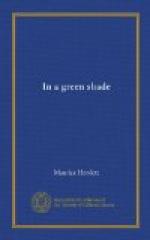Lastly, we have Coleridge’s own confession to Miss Betham that “Bacchus ever sleek and young,” as at this time Lamb called him, “pouring down,” he went on to say, “goblet after goblet,” must have outdone his usual outdoings. Here is the best he can say for himself:—
“True history will be my sufficient apology. After my return from Lady J.’s on Monday night, or rather morning, I awoke from my short sleep unusually indisposed, and was at last forced to call up the good daughter of the house at an early hour to get me hot water and procure me medicine. I could not leave my bed till past six Monday evening, when I crawled out in order to see Charles Lamb, and to afford him such poor comfort as my society might perhaps do in the present dejection of his spirits and loneliness.”
There is much more to the same effect; and surely it is not often that a philosopher, or even a poet, will treat his post-prandial dumps (to call them so) as a stroke of adverse fortune. Coleridge takes it as an act of God. “This, my dear Miss Betham, waiving all connexion of sentences, is the history of my breach of engagement, of its cause, and of the occasion of that cause.” There is much of Mr. Micawber here.
And here, so far as A House of Letters can help us, Coleridge’s correspondence with Matilda Betham ends. It may well have been the end indeed. From that date onwards the wreck of the thinker and poet slid swiftly down the slope appointed, until he came up, after many bumps, in the hospitable Highgate backwater where he was to end his days. It was a wonderful London which within the same twenty years could harbour three men, like Blake, Coleridge and Shelley, in whom the incondite spirit which we call genius dwelt so near the surface of conscious being, and had such freedom to range. With Blake and Shelley, however, once over the threshold, it was untrammelled—and with Blake at least entirely innocuous to society, except to one drunken soldier who richly deserved what he got. But with Coleridge, throughout his career, one sees it struggling like a fly glued in treacle, pausing often to cleanse its wings. The fly, you adjudge, walked into the treacle. But Coleridge always thought that it was the treacle which had walked over him.
THE CRYSTAL VASE
I have often wished that I could write a novel in which, as mostly in life, thank goodness, nothing happens. Jane Austen, it has been objected, forestalled me there, and it is true that she very nearly did—but not quite. It was a point for her art to make that the novel should have form. Form involved plot, plot a logic of events; events—well, that means that there were collisions. They may have been mild shocks, but persons did knock their heads together, and there were stars to be seen by somebody. In life, in a majority of cases, there are no stars, yet life does not on that account cease




